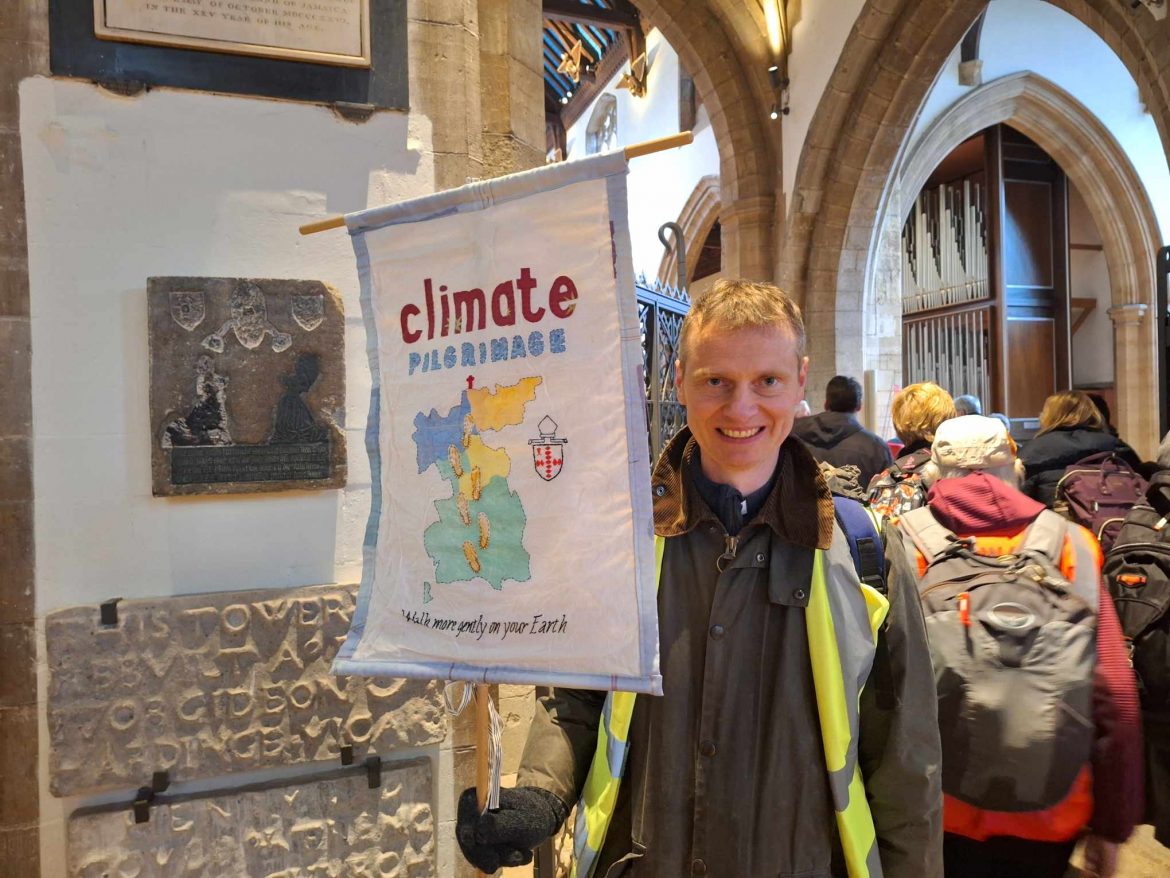Staff and church-goers from across the Southwark Dioceses carried out the second of five eco-pilgrimages across south London and Surrey to raise awareness of climate change.
Headed by Bishop Martin Gainsborough of Kingston, the walk started at All Saints Church in Market Place, Kingston, and ended at Christ Church in west Wimbledon, stopping in areas of biodiversity and environmental historical relevance.
“We are creatures of story. I wanted to choose a route where our story could start right at the crowning of Athelstan up to current issues of governance today,” said Judith Russenberger, the walk lead.
These pilgrimages are taking place over the next month during the period of Lent, the six-week period leading to Easter.
Thirty-five people took part in the walk along with families, dogs, and stewards with signs carrying similar messages to those of recent popular climate protests.
“I felt I had to take part as a Christian, but also a mother and a grandmother to walk against human greed and selfishness that is taking a toll on the earth,” said Brenda Tyrrell, a participant in the climate walk.
Walk co-ordinator, Reverend Vanessa Elston, saw it as a religious imperative to advocate for climate change but said that the themes she and the walkers are exploring this week are not exclusive to Christians.
“The prospect of climate catastrophe is overwhelming, and something about doing it with others helps us to discuss how to change things. That anxiety and grief applies to all of us,” said Elston.
To the vicar of All Saints, Joe Moffatt, now is the time for the Church of England to question the UK’s mode of governance in relation to climate change.
“The church has a moral voice. We need to re-examine how we live together. In this sense, we’re calling to host good civil conversation to make people from different perspectives imagine a better democracy,” said Moffatt.
Each eco-pilgrimage taking place over the next month carries a different theme under the umbrella of climate change.
Despite the Southwark dioceses hosting Lent pilgrimages in previous years, this is the first time the pilgrimages have been carried out in the name of climate change.
Recently appointed as Bishop of Kingston, Gainsborough is an active member of the diocese in Christian action for climate justice, and is responsible for the Church of England’s commitment become net-zero by 2030.
The Kingston to Merton walk focused on governance, democracy, and citizenship, starting alongside the Thames Path and then turning into Canbury Gardens towards Richmond.
“We’re taking our walk along the Thames for two reasons. It is part of Kingston but also symbolic of conversation. One way leads here, the other way to the Houses of Parliament,” said Russenberger.
Each stop on the route provoked a new topic of discussion. The stop in Richmond Park led to conversation on biodiversity but also the fight against the monarchy’s enclosure of common land by John Lewis in the 18th century.
More obvious connections were made on Robin Hood Lane and Wimbledon Common, which remained common land thanks to local protests in the 19th century.
“I hope our ramblers walk away from this experience and realise that they are part of the environment. Be active, not passive. There are things they can do and expect, they can ask for a different world,” said Russenberger.
Lent seemed like the opportune moment to hold a series of climate walks to Gainsborough and other members of the dioceses.
Despite 2023 being the first year to exceed the 1.5 degree global threshold, Gainsborough said that a pilgrimage during Lent encourages us to physically and spiritually slow down and “take notice of what needs changing”.
“Lent is a season of opportunity to listen more deeply to our surroundings and the things for which we are guilty of being complacent”, said Elston.
The walk coincided with the last day of the ten-day No Faith in Fossil Fuels vigil outside Parliament by Christians for Climate Action, from which Russenberger had just returned to lead the Kingston pilgrimage.
As well as bringing awareness to local communities, representatives of the Southwark dioceses such as Russenberger called on the UK government to stop issuing new fossil-fuel exploration licences in British waters.
“This is a calling to care for the earth and our neighbours. Our neighbours are not just humans, they are the animals and the ecosystems that sustain life,” said Russenberger.
The next route will be from Charlton to Deptford on Friday 1 March with a focus on finance and global trade.
The Tooting to North Lambeth walk on Friday 8 March will discuss racial justice, cost of living and air pollution. The final walk will be from Battersea to Southwark Cathedral.
All Saints is also encouraging people to take part in a Carbon Fast over Lent by avoiding meat and dairy, long showers, and driving.
Reporter and former editor for the Kingston Courier.






